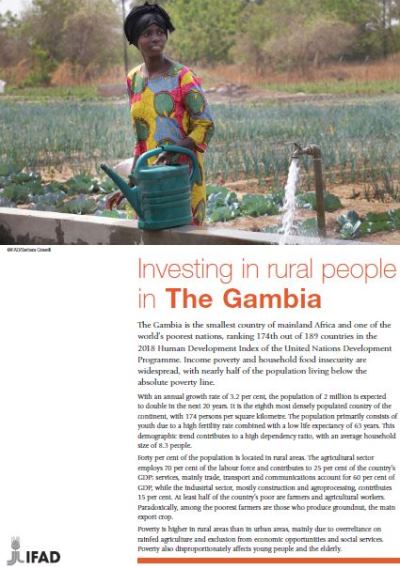Investing in rural people in The Gambia
Investing in rural people in The Gambia
Since 1982, IFAD has supported 10 programmes and projects in The Gambia totalling US$93 million and directly benefiting more than 155,000 rural households. Most beneficiaries are women. Projects focus on agricultural and rural development in the lowlands and adjacent uplands, and are aligned with government priorities.
Since the mid-1980s, IFAD has strongly supported rural microfinance projects in the country as an integral part of agricultural development. Expansion of the village-based savings and credit association (VISACA) system and the establishment of a strong national apex body to coordinate VISACA services are leading to the professionalization of the microfinance sector. This is being further strengthened by the creation of a microfinance department within the Central Bank and the launch of a centre to build the capacity of all microfinance-related entities.
The inclusion of women in decision-making and training is another priority. Projects target both young women and young men with on- and off-farm job opportunities, in light of the country’s high rates of unemployment and underemployment and its increasing rural-urban migration rate.
Strong farmers’ and community-based organizations can empower poor rural people and help them overcome poverty. IFAD works with traditional kafos (collectively run village groups) to systematically tackle the economic and social exclusion of marginalized and vulnerable people in rural areas. These groups are cohesive and able to mobilize vulnerable people within local communities, and through them IFAD-supported projects can reach out to the most vulnerable households.
A new country strategic opportunities programme (COSOP) has been approved for the period 2019-2024, providing renewed strategic guidance for IFAD’s actions in The Gambia. The COSOP envisages two main objectives:
- support to inclusive agricultural value chain development; and
- support to land and water development resilient to climate change.
